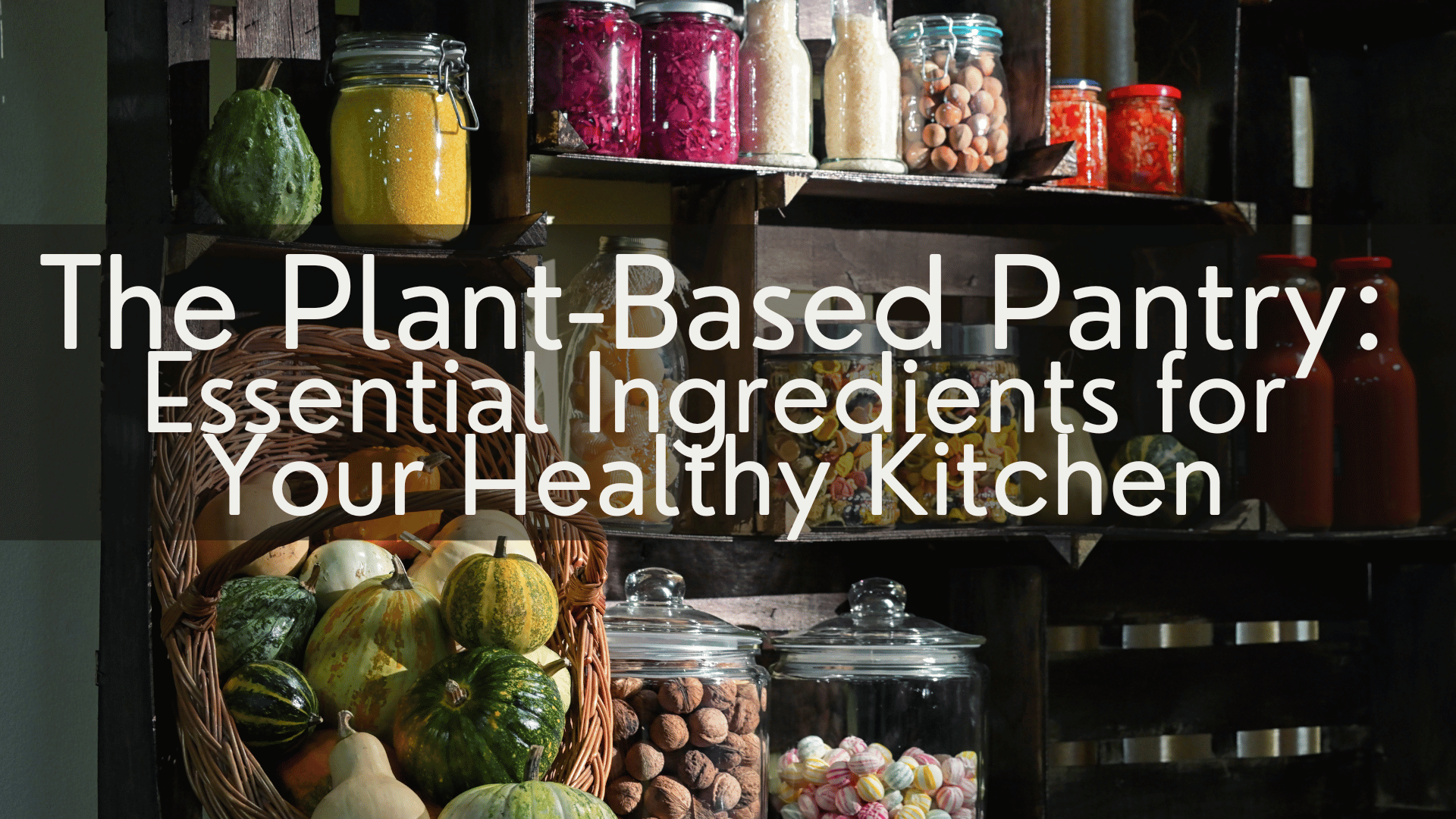In recent years, there has been a significant shift towards plant-based diets, driven by concerns about health, animal welfare, and environmental sustainability. I first made the switch about 12 years ago for health reasons. Because of the many benefits I’ve been blessed to experience with this lifestyle, I’ve been educating people on how to make the switch ever since.
Whether you’re a seasoned vegan or just curious about incorporating more plant-based meals into your diet, having a well-stocked pantry is essential for success. In this guide, we’ll explore the essential ingredients for a plant-based kitchen, helping you create delicious and nutritious meals with ease.
- Whole Grains: Whole grains are a cornerstone of a plant-based diet, providing essential nutrients like fibre, vitamins, and minerals. Stock your pantry with a variety of options such as quinoa, brown rice, oats, barley, and whole wheat pasta. These grains can be used as a base for salads, soups, stir-fries, and grain bowls, adding texture and substance to your meals. Unless you have been diagnosed with celiac disease or an intolerance to gluten, organic, non-GMO whole grains are an healthy staple to have on hand and include in your diet daily.
- Legumes: Legumes, including beans, lentils, and chickpeas, are rich in protein, fibre, and micronutrients like iron and folate. Keep both canned and dried varieties on hand for convenience and versatility. Canned beans are great for quick meals like tacos, chili, and bean salads, while dried beans can be cooked in large batches and frozen for later use.
- Nuts and Seeds: Nuts and seeds are nutritional powerhouses, packed with healthy fats, protein, and micronutrients. Almonds, walnuts, cashews, and pumpkin seeds are great options to have in your pantry. Use them to add crunch and flavour to salads, stir-fries, and baked goods, or make your own nut butter and seed blends for spreads and sauces.
- Plant-Based Proteins: In addition to legumes, there are plenty of other plant-based protein sources to explore, such as tofu, tempeh, and seitan. These versatile ingredients can be used in a variety of dishes, from stir-fries and curries to sandwiches and wraps. Experiment with different marinades and seasonings to enhance their flavour and texture.
- Herbs and Spices: Herbs and spices are essential for adding flavour and complexity to plant-based dishes. Keep a variety of dried and fresh herbs like basil, cilantro, parsley, and rosemary, as well as spices like cumin, paprika, turmeric, and cinnamon. These ingredients can transform simple ingredients into vibrant and delicious meals.
- Healthy Fats: Incorporating healthy fats into your diet is important for satiety and nutrient absorption. Stock your pantry with sources like olive oil, coconut oil, avocado oil, and tahini. These fats can be used for cooking, salad dressings, and sauces, adding richness and depth to your dishes.
- Plant-Based Milk and Dairy Alternatives: Whether you’re lactose intolerant, vegan, or simply looking to reduce your dairy consumption, there are plenty of plant-based milk and dairy alternatives available. Almond milk, coconut milk, oat milk, and soy milk are popular options for drinking, cooking, and baking. You can also find plant-based alternatives to cheese, yogurt, and ice cream made from nuts, seeds, and soy.
- Whole Food Sweeteners: Instead of refined sugars, opt for whole food sweeteners like maple syrup, agave nectar, and date syrup. These natural sweeteners add sweetness to your recipes without the added processed sugars, making them a healthier choice for both sweet and savoury dishes.
- Nutritional Yeast: Nutritional yeast is a staple in many plant-based kitchens, prized for its cheesy flavour and nutritional benefits. It’s a great source of B vitamins, protein, and minerals, making it a versatile ingredient for adding umami and depth to dishes like pasta, popcorn, and vegan cheese sauces.
- Condiments and Sauces: Finally, no plant-based pantry is complete without a selection of condiments and sauces to enhance your meals. Stock up on essentials like tamari or soy sauce, balsamic vinegar, mustard, hot sauce, and miso paste. These ingredients can be used to season dishes, add acidity, and create depth of flavour.
By stocking your pantry with these essential ingredients, you’ll have everything you need to create delicious and nutritious plant-based meals with ease. Experiment with different flavours, textures, and cuisines to keep your meals exciting and satisfying. With a well-stocked pantry and a little creativity, embracing a plant-based diet can be both delicious and rewarding for your health and well-being.
Looking for more information on how to stock your healthy plant-based kitchen or how to make the switch to a plant-based diet? Check out my latest book on Amazon, A Beginner’s Guide To Going Meatless.
Until next time,
Keep rockin’ your wellness!
Rachel J. Olsen, BSc., MBA
Plant-Based Health Coach & Author


